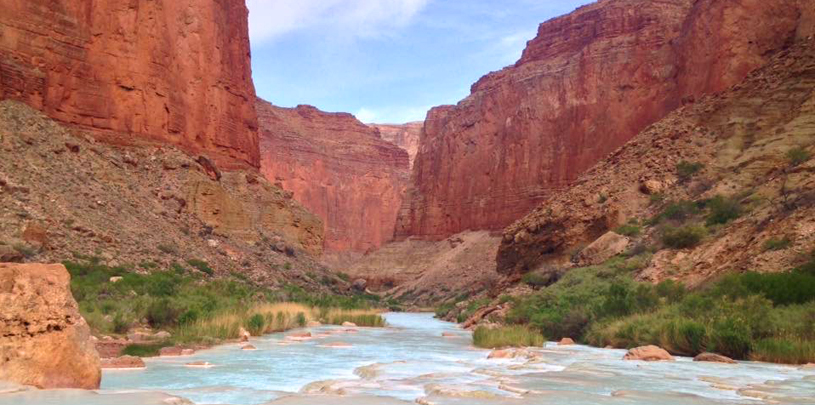
 by Roger Clark, Grand Canyon Director
by Roger Clark, Grand Canyon Director
The public comment period on preliminary permit applications from a Phoenix company proposing to dam the Little Colorado River for hydroelectric power near Grand Canyon National Park officially closed a few weeks ago. But the company behind these applications, Pumped Hydro Storage LLC, didn't seek or receive proper consent from the Indigenous tribes and nations who call this area home, including the Navajo Nation, on whose reservation the dams would sit. The area is of vital importance to the Hopi and numerous other Grand Canyon tribes.
Tribes, government agencies, and non-profit organizations weighed in and thousands of concerned citizens submitted comments. The Grand Canyon Trust, represented by Earthjustice, filed a motion to intervene before the Federal Energy Regulatory Commission (FERC) to oppose these dams.
Now that the dust has settled, let's take a look at some of the key players who commented and sought to intervene, including the Navajo Nation, the Hopi Tribe, and the Hualapai Tribe, with sovereign tribal nations requesting government-to-government consultation since the projects would dam a river and destroy an ancestral landscape that their people have been tied to since time immemorial.
A little background if this is the first time you're hearing about this: The company is proposing two separate projects with two dams each (upper dams on the rim and lower dams on the river).

The lower dams — concrete arches 1,000 feet wide — would flood the Little Colorado River Gorge and cause environmental devastation, including wiping precious habitat for the endangered humpback chub off the map.

The Navajo Nation filed motions to intervene before FERC strongly opposing both project applications. The proposed dams would be built on Navajo Nation land inside a Navajo Nation Department of Fish and Wildlife biological preserve within the Little Colorado River Navajo Tribal Park. But according to comments submitted by the nation, Pumped Hydro Storage LLC didn't meaningfully consult with the Navajo Nation or the local chapters where the project would be located. The company also did not "seek the consent of the Navajo Nation."
Among its reasons for opposing the projects, the Navajo Nation listed the fact that the dams "may adversely impact the cultural resources of the Navajo Nation, including the Traditional Cultural Properties of the Confluence and Blue Springs."
On November 20, 2019, the Cameron Chapter of the Navajo Nation, near where the dams would be located, unanimously passed a resolution against the applications.
Read the Navajo Nation's full motions to intervene regarding the so-called "Navajo Nation Salt Trail Canyon Pumped Storage Project" application here and comments on the "Little Colorado River Pumped Storage Project" here.

In October, the Hopi Tribe was among the first to speak out in opposition to the dam projects, citing concerns about their ancestral sites and threats to the Salt Trail, the confluence, and their place of emergence:
“Any development within the area of the Confluence will forever compromise the spiritual integrity of this Sacred Place…This proposed development and location is simply unacceptable to Hopi religious leaders, practitioners and the Hopi people as it will significantly and forever adversely impact Hopi sacred places.”
–October 23, 2019 letter to FERC from the Hopi Tribe
Read the full letter from the Hopi Tribe here.
To the west, the Hualapai Tribe also expressed both cultural and economic concerns, emphasized how a dam upstream of the confluence could upset a fragile ecological balance, and urged FERC to reject the preliminary permit application.
"...the Hualapai Tribe is deeply concerned about the devastating cultural and ecological impacts that would result from the construction of a dam and related infrastructure and facilities...A project such as this would forever disturb a traditional cultural landscape that maintains historic and sacred values and that is part of the cultural identity of the Hualapai people and other neighboring tribes."
–November 14, 2019 letter to FERC from the Hualapai Tribe
Read the full comments of the Hualapai Tribe here.
The Havasupai Tribe has also expressed concerns. The Indigenous tribes and nations of the Grand Canyon region aren't the only ones concerned about this project. The U.S. Department of the Interior, the Arizona Game and Fish Department, and others have also weighed in.
If you're among the thousands who commented on these proposals, thank you.
While we wait for FERC to decide what to do next, you can help by educating others about the proposals and the harms they could cause if permitted to move ahead. If you'd like to be notified when there's another chance for the public to act, please join our action alert network now ›
80% of Arizona voters support Baaj Nwaavjo I'tah Kukveni National Monument, according to a new poll.
Read MoreThe Colorado River below Glen Canyon Dam is heating up. Find out why.
Read MoreGroundwater pumping at a uranium mine near the Grand Canyon will affect the canyon's springs, scientists says.
Read More